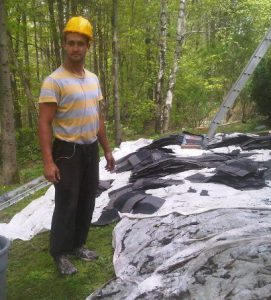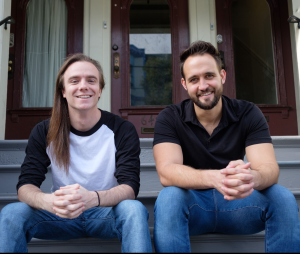How a 3rd generation roofer is disrupting the roofing market
For years, roofing has been seen as a traditional industry, relying on skills passed on from one generation to another. After working in the space for nearly 12 years, Richard Nelson, Founder and CEO of RoofR, saw an opportunity to introduce an innovative solution to modernize and digitize the field.
RoofR’s software allows roofers to measure any roof from anywhere with near pinpoint accuracy through aerial imagery and creates polished proposals that help seal the deal. Their tools help roofers streamline their workflow, helping both homeowners and contractors.
We caught up with Richard to learn more about how their company has evolved over the years, their recent raise, and what they have in store for the future.
For years, roofing has been seen as a great trade in the construction industry, but not necessarily an industry that adopts new tech solutions. As a third-generation roofer by trade, could you tell us a bit about what led you to found RoofR?

“The first time I was on a roof, I was 12 years old. Roofing was our family business: my grandfather was a roofer, my uncle was a roofer, and my dad was a roofer. I was a part of the family business for nearly 12 years and then took a job with one of the largest roofing contractors in Toronto. I soon realized how broken and archaic the roofing industry was, and knew I needed to do something to fix it.
So I decided to quit my job, sell my house, and put everything I had into RoofR. Together, with my partner and CTO Kevin Redman, we decided it was time to disrupt the industry.
What I realized as a roofing contractor and salesman was just how many inefficiencies existed. Consumers did not have a way to find good roofers, and there was a lack of tools available for roofers to streamline their workflow digitally.
This sparked the vision of creating an end to end roofing platform that helps both homeowners and roofing contractors — a software as a service (SaaS) for roofers.”
“This sparked the vision of creating an end to end roofing platform that helps both homeowners and roofing contractors — a software as a service (SaaS) for roofers.”
How would you describe the experience of introducing a new tech platform to a market that may be hesitant to change? How did you break into the industry?
“I come from a family of roofers, and even some of my family members were a bit skeptical of the idea. Traditionally, the construction industry was not tech-enabled, but ultimately I understood the pain points that these roofers were going through, living it myself.”
Richard knew that if he could build a really powerful, but simple software for roofers to utilize, he could make a big difference in the industry.
“As we began to roll out SaaS features, specifically the measurement tool that allows roofers to measure through satellite, there was certainly some push back from roofers who typically use a tape measure.”
Rather than driving to a client’s house to take measurements, go back to the office, and then return with a final quote, roofers can enter an address in their system and have a complete roof measurement within minutes that auto-calculates material quantities and creates a professional proposal a customer can e-sign.
“Once we explained to roofers the benefits and the value that we add, that skepticism was pushed aside and they were willing to adopt.”
When the pandemic hit, going digital was inevitable for roofers. This presented an opportunity for RoofR to really solidify its position in the space. Roofers needed to be able to provide quotes and proposals to homeowners digitally, so they had no other choice than to look for reliable solutions they could trust in order to keep their clients safe. Roofr was the solution.
Could you explain to us exactly how the RoofR platform works?
“We enable roofers to measure any roof, from their desk, or in the field, in under two minutes with near pinpoint accuracy through our aerial imagery software. Roofers can then take those measurements and auto populate proposals that can be sent to their customers for e-signature.”
From measurement, to proposal, to a signed contract, RoofR has created a sales toolbox for roofers — automating the entire process under one platform.
It was recently announced that RoofR secured $4.25 million USD in funding, bringing your new total amount raised to $8.25 million. What does this new round of funding mean for the company, and do you have any specific plans?

“We are obsessed with providing a world class customer experience. We go above and beyond with every single customer, even if it doesn’t necessarily scale. With this investment, we plan to build out our sales, customer success, support, and engineering teams to help drive this world-class experience.
What impact did the DMZ have on RoofR’s trajectory?
“I was not able to get a meeting with a venture capitalist (VC) before my time at the DMZ. Within two weeks of being part of the program, I had a handful of meetings with VCs that were able to help me refine my pitch.
Our time at the DMZ helped set us up for our Y Combinator interview. I was able to connect to other founders that had also gone through the YC interview process, and had mock interviews to get hands-on investor practice. I credit a lot of us getting into Y Combinator to the DMZ.”
Moreover, the DMZ was able to help RoofR expand its network and gave the startup a sense of community. “Whenever I needed help, I could walk into the DMZ’s common space and find someone knowledgeable to ask questions, or reach out via email. It was a sense of community that I really loved. And I needed it at that time, because being a solo entrepreneur can be wildly lonely.”
“Whenever I needed help, I could walk into the DMZ’s common space and find someone knowledgeable to ask questions, or reach out via email. It was a sense of community that I really loved. And I needed it at that time, because being a solo entrepreneur can be wildly lonely.”
As an Alumni-in-Residence at the DMZ, what has been your favourite part about mentoring other startups?
“I get a lot of joy out of being an Alumni-in-Residence. I love giving back and helping founders with advice and insights to help them avoid the same mistakes that I’ve made. Being exposed to all the other innovative startups and business models that are being leveraged is also very captivating.”
Richard played a part in helping DMZ alumni company Turing Labs get into the Y-Combinator as well, which he described as “an incredible moment that allowed him to give back to the community.”
What advice would you give to a fellow founder who is looking to raise funds for their startup?
“When you do get a chance to meet with an investor, make sure you know your numbers. This is a mistake that will affect your credibility. Investors will likely ask you about your growth rates, unit economics and number of active users…etc, so make sure you are prepared.
Focus on telling a story. Rather than just reading off of slides, paint the bigger picture. Remember that as a seed stage company they are often investing in you rather than the company. Sell yourself – why are you the best person to build this multibillion dollar company? Can you pivot if need be? Make sure to really craft the narrative around the size of the opportunity, why now is the time, and why you’re the best person to do this.”
“Remember that as a seed stage company they are often investing in you rather than the company. Sell yourself – why are you the best person to build this multibillion dollar company? Can you pivot if need be? Make sure to really craft the narrative around the size of the opportunity, why now is the time, and why you’re the best person to do this.”
Are you also obsessed with providing world-class customer experiences? RoofR is growing rapidly and has a wide-range of positions available including, sales, product, engineering, finance, and customer success. Head over to jobs.lever.co/Roof to learn more!

